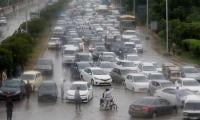Islamabad: Benazir Income Support Programme (BISP) and KfW Development Bank will join hands to disseminate awareness about mother and child health in line with Benazir Nashonuma initiative.
This was discussed during a meeting of Chairperson BISP, Senator Rubina Khalid with the KfW Development Bank mission at BISP headquarters on Friday. BISP Chairperson Senator Rubina Khalid, emphasised the critical link between the health of mothers and the health of their children. She highlighted BISP’s commitment to designing and implementing health initiatives aimed at combating malnutrition and stunting among women beneficiaries and their children under Benazir Nashonuma.
The meeting was attended by Dr Patrick Rudolf, Head of Division in Health, KfW Frankfurt, Anna Berzovskaja, Portfolio Manager in Health and Social Protection, Dr. Matthias Nachtnebel, Technical Adviser, Dr. Masuma Zaidi, Senior Sector Specialist, KfW Pakistan, Additional Secretary Dr. Muhammad Tahir Noor, and DG NSER/CCT Naveed Akbar.
Chairperson Rubina Khalid proposed collaborative initiatives with KfW to raise awareness about nutritious food and the benefits of breastfeeding for new-borns. She suggested utilising the services of the network of lady health workers and discussed the importance of reproductive health for women. Additionally, Chairperson Rubina Khalid underscored the necessity of skill training for members of Benazir Income Support Programme beneficiary families, deeming it essential for poverty graduation.
The KfW mission also assured full support for BISP’s future health initiatives for women and children and praised the role of the National Socio-Economic Registry NSER database in responding to crises such as floods and the COVID-19 pandemic.
This photograph taken on May 6, 2024, shows teachers leading a class of students at a school in Lahore. —...
Islamabad Deputy Commissioner Islamabad, Irfan Nawaz Memon chairs a meeting on June 29, 2024. — Facebook/Office of...
A person can be seen holding notes of Pakistani currency Rupee in his hands. — AFP/FileRawalpindi:Representatives of...
Hindu pilgrims leave leaving Amarnath Cave in southeast of Srinagar, IIOJ&K on July 2, 2019. — ReutersThe Amarnath...
In this image, Prof Dr M Iqbal Choudhary and Prof Dr Sammer Yousuf gesture for a photo after they receive the...
This representational picture shows a woman experiencing stomach pain. — Unsplash/FileRawalpindi:Water and...







